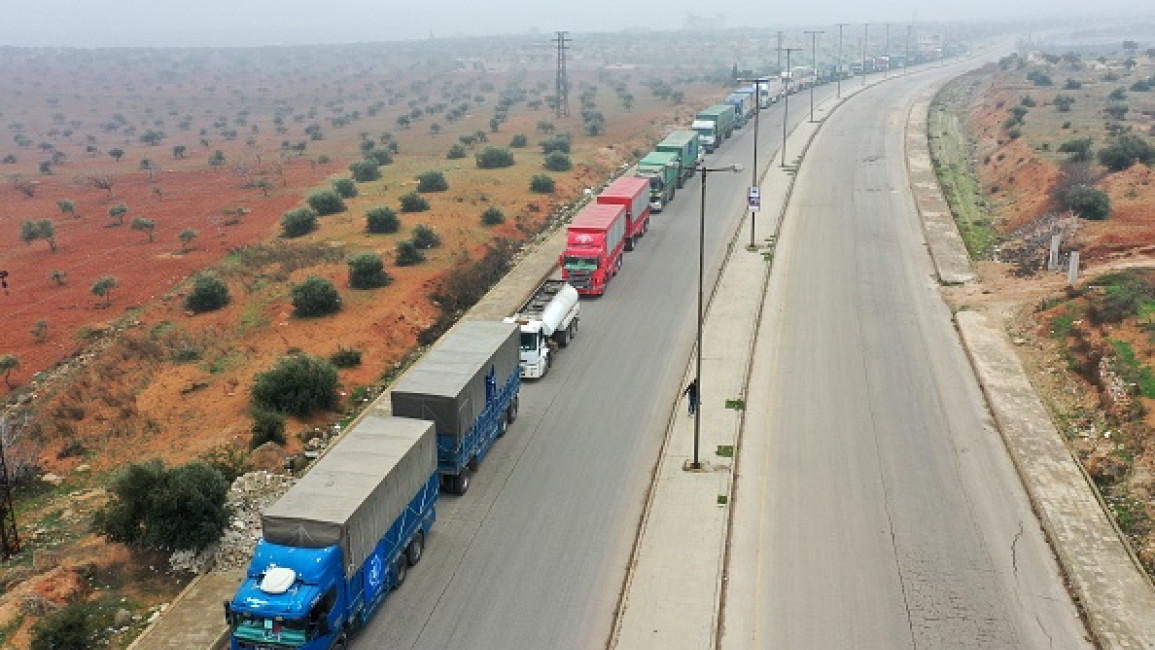Syria earthquake aid convoy stuck at rebel-regime crossing
An aid convoy is stalled for a second day at a crossing in northern Syria waiting for the green light to deliver humanitarian supplies to quake-hit areas, aid agencies said Thursday.
The Syrian Red Crescent (SRC) confirmed they were still waiting at the Saraqib crossing in Idlib province for a green light from "all parties" to enter opposition areas.
Millions there are in desperate need of aid, after the 6 February devastating earthquakes in Turkey killed thousands in northern Syria and made more homeless.
For the second consecutive day @SYRedCrescent aid convoy is at #Saraqeb crossing point, waiting for approvals of entry.#Idleb #Syria pic.twitter.com/hQmOrubciq
— Syrian Red Crescent (@SYRedCrescent) March 9, 2023
The parts of Idlib and Aleppo, where the aid is to be delivered, are controlled by Hayat Tahrir Al-Sham or Turkish-backed rebels while Saraqib is under the command of the Syrian regime.
"The Syrian Arab Red Crescent are at Saraqib crossing point, waiting for the approvals to be obtained by all parties to deliver a humanitarian aid convoy for the people affected by [the] earthquake in Idleb (Idlib) and its countryside, and Aleppo western countryside," it wrote in a statement.
It is worth mentioning that the relief items are supported by the humanitarian partners: The UN Agencies, European Union and the Red Cross Red Crescent societies.
— Syrian Red Crescent (@SYRedCrescent) March 8, 2023
Those supporting the relief efforts are UN agencies, the European Union, and the Red Cross and Red Crescent societies.
It was not clear which parties it was awaiting approval from, but the convoy would have to cross through regime checkpoints before reaching rebel-held Idlib.
The New Arab reached out for comment.
Before the 6 February earthquake, aid would enter Idlib through the Bab al-Hawa crossing with Turkey.
Following the disaster, and after calls to speed up aid deliveries, Syrian President Bashar al-Assad ascended to the opening of two more crossings with Turkey - bringing the total to three - to allow more aid into the region held by his armed opponents.
The UN was criticised for this, given the thousands in urgent need of aid and the fact that Assad is not even in control of these checkpoints.
Experts pointed out that approval by Damascus was unnecessary, as the humanitarian crisis made unilateral action by the UN, with or without the regime's consent, valid under international law.
Many likely died waiting for this formality to be approved, they said.
The UN had already struggled to gather funding to address Syria's worsening humanitarian crisis before the earthquake hit and had secured just half of its 2022 appeal.
Despite a recent reduction in fighting, it said Syrians' needs are at an all-time high and UN agencies required nearly $400 million over the next three months to respond to the quake in Syria alone.
Aid has continued to come into Syria through airports held by the regime, but recent Israeli airstrikes on Aleppo airport have temporarily put it out of service.
The 7.8 earthquake killed at least 53,000 people - including more than 10,000 Syrians - and devastated large swathes of southeast Turkey and northwest Syria.


![President Pezeshkian has denounced Israel's attacks on Lebanon [Getty]](/sites/default/files/styles/image_684x385/public/2173482924.jpeg?h=a5f2f23a&itok=q3evVtko)



 Follow the Middle East's top stories in English at The New Arab on Google News
Follow the Middle East's top stories in English at The New Arab on Google News


